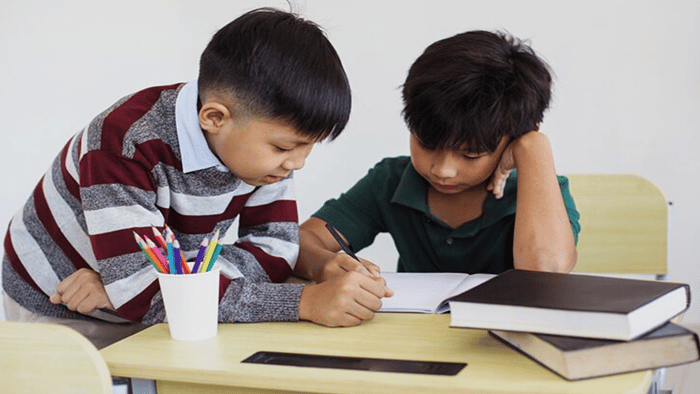- Improves Teamwork
- Bridges Learning Gaps
- Eliminates Procrastination And Co-Dependence
- Introduces New Perspectives
- Tries Different Learning Approaches
- Teaches Responsibility
- Motivates Them
Introduction

Distractions are endless in the 21st century. In earlier decades, kids studied better due to a lack of mobile phones, computers, and tablets, absorbing knowledge in a distraction-free environment. Now, from social media notifications to texts to video games, temptations, and digital distractions are endless. And being cooped up in their rooms all day can make your kids feel demotivated during long study sessions. This listlessness can lead to poor focus, frequent breaks, and a lack of knowledge retention.
And that definitely leads to poor performance and a dearth of academic improvement. To avoid all such negative modern distractions, group study is a wonderful solution. It helps break all and any vicious study spirals, creating room for fresh perspectives and answers. Here is a quick guide to the benefits of group study sessions along with tips on how to organize them.
Benefits Of Group Study Sessions
Improves Teamwork

Group study teaches your kids the merits of teamwork. While avoiding herd mentality and being one’s own person is important, incorporating a spirit of teamwork improves social intelligence, interactions, and engagements. It teaches children how to function together, work to each other’s strengths, and provide excellent academic outputs.
Bridges Learning Gaps
It is not possible for children to retain every bit of information imparted in school and tuition. Group studies help bridge those learning and comprehension gaps, increasing revision and review of topics while explaining things to one another. Also, when friends check each other’s notebooks and correct one another’s mistakes, there is no greater shared learning of knowledge and virtue than that.
Eliminates Procrastination And Co-Dependence
Students are usually demotivated and too tired or lazy to study when alone. But a weekly or bi-weekly group study session can switch things up. When children are in the company of their friends or peers, they cannot afford to be demotivated or lazy.
Introduces New Perspectives
Group study sessions usually introduce new perspectives to kids. If they are stuck solving a math problem in a particular way, they may be more open to a fresh take from their friend than their parent. Also, multiple viewpoints help maximize academic output. Plus, it gives kids the choice to follow the viewpoint they deem best of the lot, improving their analytical skills in the process.
Tries Different Learning Approaches
There are different kinds of learning strategies out there, but kids are mostly divided between four types of learners, visual, auditory, kinesthetic, and scholarly. While visual learners prefer attractive visual inputs for ideal processing, auditory learners prefer hearing and remembering or making mnemonic devices. Kinesthetic learners prefer studying hands-on, or on the go, while scholarly learners prefer deeply researching and then writing things down to remember well. Group studies expose kids to different learning approaches, helping them figure out what works best for them and studying with similar-minded individuals.
Teaches Responsibility
Group studies inculcate a sense of responsibility in kids. Sure, they can goof off the first couple of sessions, but once the realization sets in that they may be a subject of ridicule if they do not perform well in their study group, their sense of responsibility starts blossoming. After that, your worries can be at rest, mostly.
Motivates Them

Group study sessions are ideal for motivating kids. Often, good students do not try for excellence due to a sheer lack of drive. Group study sessions instill healthy competition in children, inspiring them to do better. But ensure healthy competition does not transgress the limits of the study room and friendship remains resolute among the kids.
Tips On How To Organize Group Study Sessions
- Do not let too many cooks spoil the broth, so restrict the number of people in a group study to 4 or 5 kids maximum.
- Try to get the kids together for group study sessions at least twice a week to see any benefits in a month or two.
- They should have a clear study schedule and follow it, moving from one subject or topic to another, within allotted time slots to study at a productive speed.
- If the group study session focuses on problem-solving or discussion of new topics, at least one of the kids should oversee noting down important points such as notes and sharing them at the end of every session with others. This person can change every week on a rotational basis.
- Take monthly house tests of your kid’s study group, to ensure they keep up with their promises and academic duties.
- Keep healthy yet tasty snacks and beverages handy as study sessions with friends require a lot of fuel.
Conclusion
Group study has its advantages and disadvantages, but the former greatly outweighs the latter. And since its benefits are endless when practiced from an early age, it's always the right time to start. As for older kids, group study sessions make them responsible and motivated to do better. So, give this guide a try and watch your kid’s academic future bloom.
Kaushiki Gangully is a content writing specialist with a passion for children's nutrition, education, and well-being. With more than five years of writing experience and a science-based background, she provides nuanced insights to help families raise happy, healthy kids. Kaushiki believes in making learning and healthy eating fun, empowering parents with practical, easy advice.
The views expressed are that of the expert alone.
The information provided in this content is for informational purposes only and should not be considered a substitute for professional medical advice, diagnosis, or treatment. Always seek the advice of your physician or another qualified healthcare provider before making any significant changes to your diet, exercise, or medication routines.
References
https://studyinindia.gov.in/ten-reasons-to-study-in-india-
https://pmc.ncbi.nlm.nih.gov/articles/PMC8368645/
https://www.ugc.gov.in/pdfnews/6100340_Concept-Note-Blended-Mode-of-Teaching-and-Learning.pdf
















